
Municipal Autonomous General education institution
«Secondary General Education School № 20 Ulan-Ude»
Project
FORWARD TO THE PAST
The teacher of English
Ilyina Maya Ivanovna
Ulan-Ude
2022
Explanatory note
Actuality
Many decades have passed since the victorious end of the Great Patriotic War. Every year the Victory Day is becoming more and more a sad occasion. Veterans of the war – our grandfathers and great-grandfathers are leaving us every day, every hour and every minute. And we have to admit with sadness that the memory of that war goes away with them.
So it was decided to develop and implement the project "Forward to the Past" through a series of the English language lessons. All facts and data are taken from the book «Вперёд в прошлое», the texts of which were translated from Russian into English and adapted for the students of 10 and 11 grades. The author of the book is Ilyina Maya. Every chapter is followed by tasks in the presentation. The texts should be copied for every student – 1 chapter for 1 lesson. They are provided with photos and a glossary. The project is divided into 9-10 lessons and should be carried out within 2 or 3 months.
The project is dedicated to an ordinary man whose life is closely connected with the history of our Motherland. His name is Ilyin Ivan Alekseevich. Unfortunately, he didn’t live to see the significant event - the 75th anniversary of the victory. But a veteran, turning to the younger generation, simply and accessibly tells about his life path and the people who surrounded him throughout his life.
So just for a while he invites us to go with him forward to the past...
Project goals:
· Expanding knowledge about the Great Patriotic War;
· Formation of the interest in the history of the homeland;
· Development of moral and patriotic qualities: bravery, courage, love of the Motherland, pride for the nation’s feat.
Project objectives:
1. To make acquaintance with the life story of one of the Great Patriotic War participants – Ilyin Ivan Alekseevich;
2. To motivate the students to learn more about the history of the country through reading and understanding the English texts;
3. To teach the students to speak about the relatives and other heroes who participated in the war based on the Ivan Ilyin’s biography.
Place of realization: Secondary school№ 20
Implementation period: February-April
Project participants: 10th and 11th grade students
Equipment: Computer, projector, multimedia presentation, didactic handout, literature about the Great Patriotic war, photos of the veterans.
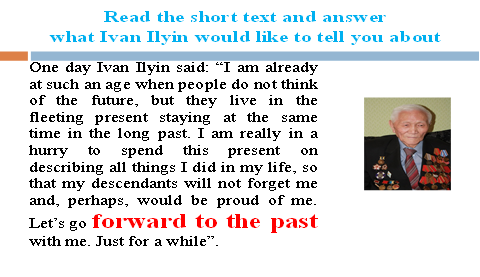
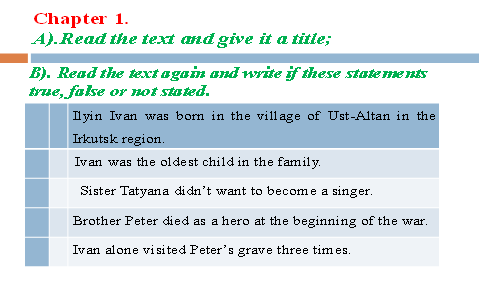
Chapter 1
I was born in the Irkutsk region in April 1923. Our village Dakhan cannot be found on the map now: it is located under the Bratsk Sea - the Irkutsk reservoir, as well as the burial place of my parents. All relatives moved to the village of Ust-Altan. My parents had four children - Tatyana, Maria, Peter and me, Ivan.
My mother, Maria Agafonovna, born in 1882, was an illiterate woman, but kind and wise with a strong character. In difficult years the villagers turned to her for help, and she refused no one. She sewed clothes for her neighbors, gave food or good advice, and sometimes reconciled them. Maria was respected by everyone in the village. If a young couple wanted to marry, but their parents did not allow them, they went to Maria-Ada, who could solve all controversial issues peacefully and calmly.
My father, Alexei Ivanovich, born in 1886, was lucky enough to study at the 6-week literacy courses until 1930. He learned to sign and write notes. In those years, my fellow countrymen engaged in grain procurement and transported it on several carts to the north along the river Lena through Yakutsk or brought meat for sale to Irkutsk. They were risky and life-threatening trips because robbers attacked and robbed the caravans. My father, as a man of remarkable strength, was often placed at the end of the wagon. It was he who could save the goods in the fight.
My older sister Tatyana, born in 1911, had a beautiful natural voice and often participated in song contests. Her tender singing always attracted the listeners, and the quiet tunes in the evenings could be heard far in the neighborhood. Her voice was fairly strong and deep. One day, my sister managed to win a song contest in several areas. Her talent did not go unnoticed: she was invited to the opera house and was taught vocal art. It turned out that it wasn’t her dream. Tatyana did not want to choose a professional singer career and went to work in the village of Aginsk. Sometime later her mysterious death occurred: in 1940 she was poisoned by an unknown person. This crime wasn’t solved and would never as it had happened long ago.
My brother Peter was distinguished by a daring, desperate, but at the same time fair character. When the war began, he volunteered for the front. In one of his letters, he wrote: “I killed 7 fascists in hand-to-hand battle. They will probably write about me in the newspaper.” Unfortunately, I never found out if a note about him had been printed. My brother died in battle as a hero, defending our homeland, and was buried near St. Petersburg in Sinyavino-1.
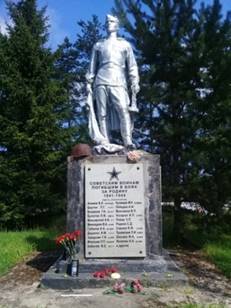
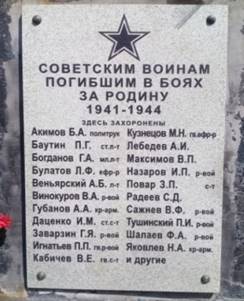
After a while, I visited his grave three times, accompanied by my eldest daughter Masha, who lives in St. Petersburg. On the monument the surname Ignatiev (not Ilyin) is written. But this is a completely different story.
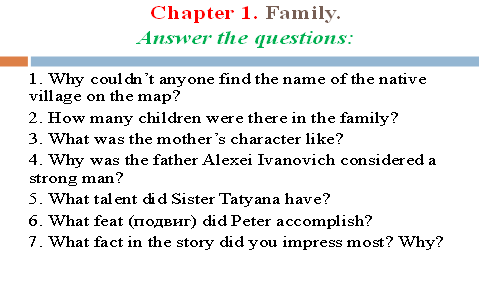
Chapter 2.The war in my life
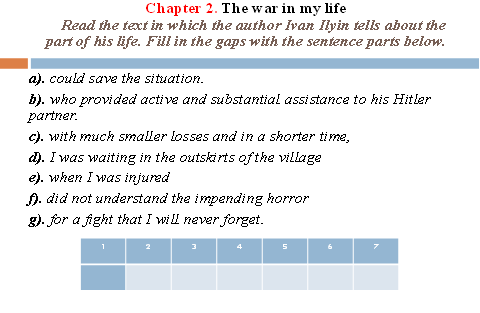
1418 long days and nights, this damned war, like a thresher (молотилка), crumbled and broke indiscriminately fates and lives of people. Then, at the age of 18, I still (1) …….and began, together with my friend, attempting to volunteer for the front. They immediately took him. As for me I went to the regional recruitment office (военкомат) several times, but they sent me back because of my short stature (154 cm). I still remember how (2) ….until it was dark and then in the background quietly made my way home. Why did I do that? The fact is that I was ashamed of the villagers for not being drafted into the army. At the last visit to the military registration office I guessed to place three insoles (стельки) into my mother’s high boots which added my height. Everything turned out as I wanted!
|
|
I put on a military uniform, but before I was sent to the front, I had studied at a regimental (полковая) school. Later at the front I became a decryption commander (командир дешифровки) of the 809th separate reconnaissance artillery division (отдельный разведывательный артиллерийский дивизион). There I grew up. In general, decryption specialists lacked at that time. And even (3) ….and got a concussion (контузия), they did not send me home for treatment. |
So, in August 1942 I moved to the Far East to defend my homeland in the war with Japan. It was a very formidable and treacherous (грозный и коварный) enemy, (4) …. . At the beginning of the war Soviet people were sure that they would defeat Nazi Germany in a very short time. We all thought: "We will throw hats at the fascists." In reality, the war lasted long four years. Of course, the Soviet Union could have defeated the Wehrmacht and the armed forces of the allies (союзники) of Germany (5) …., if it had not been forced to deploy a large group of its armed forces in the Far East.
I as many other people did everything for the victory over Japan, having received my first battle medal there. During the war years, the medal "For Military Merit" («За боевые заслуги») was awarded for skillful, proactive actions in battle, which contributed to the successful completion of combat missions (выполнение боевых задач) by a military unit. I got that medal (6) …. .
We had to make our way through the Khingan Mountains, the individual peaks of which reached the height of 2 thousand meters. The terrain was unknown, and an enemy could lurk (притаиться) behind every bend. We dragged (перетаскивали) heavy equipment in our hands. If the ledges (уступы) of the mountains crumbled under the metal weight, what about living people - tired, exhausted, and thirsty? Suddenly the enemy opened fire on our positions, and most of the equipment fell into the canyon. Crossing the mountains became impossible under continuous enemy fire. My brother-soldiers (однополчане) were dying. Only an accurate hit (точное попадание) at the enemy’s location (7)… .As a decryption commander, I managed to determine their location. We returned fire, thus defeated the enemy. The victory in that battle was ours. In general, the victory over Japan was very difficult: the Armed Forces of the USSR lost more than 36 thousand people killed, wounded and missed in the war.
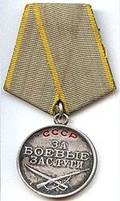
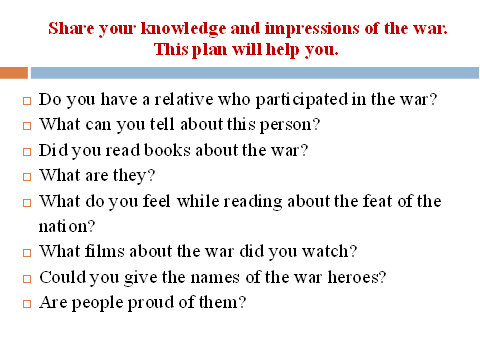
Chapter 3. The long-awaited peaceful time
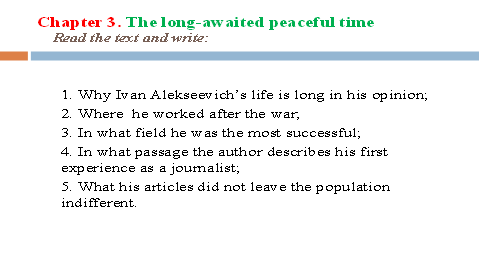
A). I was demobilized in 1947 with the rank of platoon commander (командир взвода). As I had managed to graduate from the Irkutsk Cooperative College before the army, I had already a specialty. I began working as an accountant, engineer and economist in the Khabarovsk Territory, then in senior positions, both in the Irkutsk region and Buryatia. I never stopped studying in my life. In 1967 I graduated from the Forestry Technical School of the Buryat Autonomous Soviet Socialist Republic and Irkutsk State University with a degree in journalism. I dare to assure that I found myself in the field of journalism.
B). I remember my first article. In 1942 I studied at the Junior Commander School of the 9th Separate Rifle Regiment (школа младших командиров 9-го отдельного стрелкового полка) in Chita. Once there was poisoning (отравление) in the dining room of 6-7 people. That sad event I described in the newspaper “Komsomolsky Spotlight”. Then always, no matter where I worked, I could not pass by negligence and injustice (халатность и несправедливость). That's why in the beginning of the 70s my life path led me to the public reception (общественная приёмная) of the newspaper “Pravda Buryatiyi”. It was not accidental. Before moving to Ulan-Ude, I lived in the city of Angarsk and collaborated (сотрудничал) with the local newspaper “Banner of Communism” as a member of the public reception.
C). Now I have many critical publications: “Where is the time lost?”, “Underestimate and lose”, “Under the funeral march” and many others, which raise topical issues of that time and received a large number of readers' feedback (отклики).
D). As a journalist, I felt myself like in a fight. And these words are not false. For example, the sensational case of the elderly and disabled people from the Nursing Home (Дом престарелых), who complained of poor nutrition (питание) and non-payment of monthly allowances (ежемесячное пособие) of 19 rubles 60 kopecks. According to their appeal, I conducted an investigation, convened collegiums, as a result of which some leaders lost their posts.
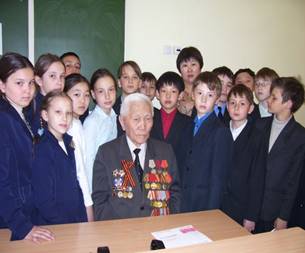 E).
I devoted 45 years of my life to work in public volunteer newspaper, trying to
benefit people. In 8 trials in which paid advocates had failed, I won. I am
deeply convinced that one cannot live in society and be free from it.
Therefore, I was not sorry to spend my life and health (I took people's sorrows
to heart) for problem solving of citizens in difficult life situations. And now
I think that my longevity is inextricably linked with gratitude of people for
the help and sympathy
E).
I devoted 45 years of my life to work in public volunteer newspaper, trying to
benefit people. In 8 trials in which paid advocates had failed, I won. I am
deeply convinced that one cannot live in society and be free from it.
Therefore, I was not sorry to spend my life and health (I took people's sorrows
to heart) for problem solving of citizens in difficult life situations. And now
I think that my longevity is inextricably linked with gratitude of people for
the help and sympathy
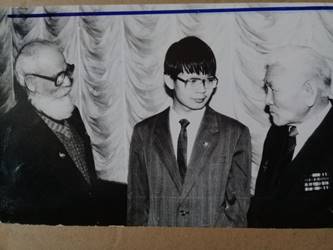
Chapter 4.The only love of mine
My longevity (долголетие) is, undoubtedly, connected with my beloved wife Elizabeth, whom I met in war years. The rear (тыл) then provided great assistance to the front. To support the fighting spirit of the soldiers, the girls wrote letters, knitted socks and mittens and sent them to the front. Such packages came to our unit, one of which was from Zangeeva Liza. From a non-Russian girl (judging by the surname) a gift was given to me - a non-Russian. We began to correspond. The letters of this fragile girl - the eldest in a large family became my talisman. Lisa was very active. She organized the Komsomol brigade, which was constantly advanced. I was able to see this amazing girl in 1946, having received a vacation in the army. There was one meeting with her, and then we had 58 unforgettable years of marriage.
I arrived to her unexpectedly. She did not wait for me and was greatly surprised. I saw how they lived. Their father, Halbai, served in the cavalry and died during the war. The family was large (5 children) and my Lisa was the oldest. To help a sick mother raise the younger children, Liza began to work from an early age.
So, a young, strong and athletic man came to the girl and wanted to show off (покрасоваться). I remember it was winter. I went out into the yard and began to wipe myself with snow. A man walking by stopped to talk to me. The weather that day was windy, and I, steamed and sweating, supported the conversation. As a result, I caught a cold. The high temperature, and most importantly the unwillingness to part with my beloved, delayed me for several days. To prove my illness, I took a medical certificate from a rural paramedic (сельский фельдшер). The stamp (печать) on the certificate was triangular, but it was required a round one. That little thing changed all my life. According to the laws of the post-war period, I was sentenced (приговорен) to three long years for being several days late to an army unit.
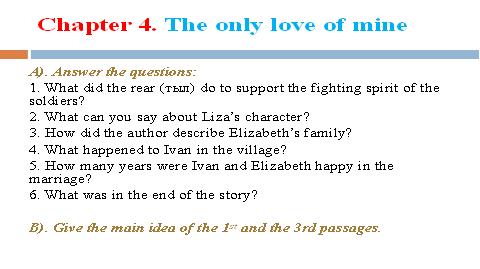
Chapter 5.This scary word – “Kolyma”
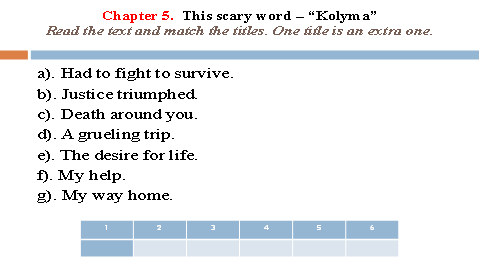
1. This word terrified everyone, and this horror was to be tested by me - a person who did not commit a crime. Kolyma is a severe cold, constant hunger, exhausting work, loss of human appearance, animal condition, every minute expectation of death from all listed above and from “friends in misfortune” for a piece of bread, clothes or shoes. Kolyma is a certain death, when the only one of thousands of people survives.
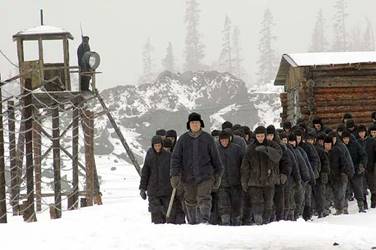
2. I survived because I really wanted to live; I wanted to return to my young wife and love. I survived because my beloved was waiting for me, praying and not forgetting me. I survived because the spirits of my ancestors (духи предков) helped me. And my physical training was very useful to me.
3. So convicts (осуждённые) were transported to the place of detention (место заключения) on an overcrowded steamboat. People lay side by side, suffering from seasickness. No one could eat. This disease did not affect me, and I helped as I could by delivering water or food to the sick and weak. Many people died during this many-day trip. Smelling death, our ship was tirelessly followed by sharks (акулы) waiting for food. And they regularly received it: the dead were thrown overboard. These clever predatory (хищные) fish knew how to free people's bodies from wet clothes. They simply threw them up several times and tore it up on the fly. Such a sight could break anyone. It’s good that many convicts did not see this, as they were not strong enough to rise from the deck.
4. So we arrived at the place, and here for the first time I felt the cruel law of survival. I was sleeping after a grueling (изнурительный) trip in all my clothes on me. Suddenly I felt someone crushing (придавив) my legs with the weight of his body and untying the laces (шнурки) on my shoes. To remain without shoes in the permafrost area (зона вечной мерзлоты) equals to die. I had to hit him. Having done this, I moved to another place. The blow (удар) to the head was fatal.
5. There was a case when I played a big role in the fate of a red-haired fellow, convicted of digging a bag of frozen potatoes for his elderly parents. I wrote a petition for clemency (прошение о помиловании) on his behalf (от его имени). I don’t know who was more pleased with the positive resolution of the issue, him or me?! This was my first experience of protecting people.
6. Inspired by success, I wrote a petition for my clemency, where I indicated that I had not committed a crime, but was late to the unit due to illness. On the medical certificate from the rural medical assistant, in principle, there could not be a round stamp, only a triangular (треугольная) one. Of course, my petition had been considered for a long time, and in the end I was rehabilitated and all my awards were returned.
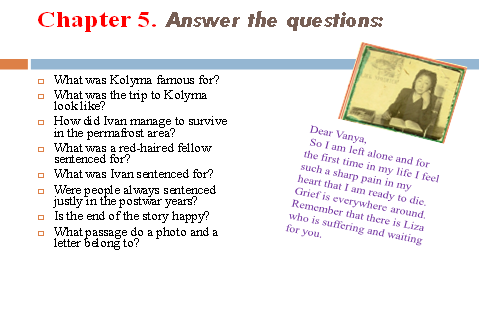
Chapter 6. New life
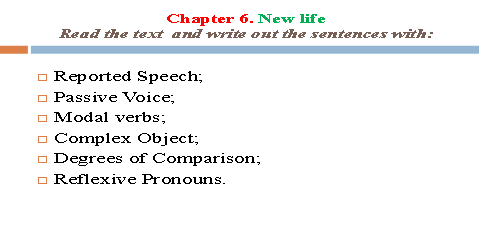
The new life was not as rosy as I had imagined before. Our oldest daughter Lyuba died of the disease in infancy. People lived in difficult conditions. Lisa and I did not have any apartment, and together with another family we lived in Angarsk at Aunt Olga’s place. Someone gave us a towel, and there was only one spoon for both of us, but we were happy. We lived in poor conditions, and every morning I went to work, taking my lunch away: bread spread with margarine. In the evenings, I worked as a graphic designer and at the same time was a part-time student. My family was growing and I wanted my children to be well fed and provided.
In 1952, daughter Mary was born, and a year and a half later, another daughter, Maya. I didn’t not hide the fact that I had always dreamt about a son, but God did not give. And that offense (обида) was often expressed by me to my grown up daughters. This is probably why they did not change their maiden name (девичья фамилия) when they got married. This is probably why the youngest daughter in her childhood said as a son: "I myself." And, probably, that's why she enrolled secretly from us in the sambo wrestling club. Now, of course, I have nothing to regret, I am really proud of my daughters.
They married and presented us grandchildren. But all that may be I wouldn’t have seen. In 1977 I was diagnosed with lung cancer. I had suffered so much before in my life and should I die in peacetime?! My wife encouraged me as best as she could, but I somehow saw her wet eyes. The family council decided that I needed to go to Moscow to clarify the diagnosis. The mood was decadent. Would I be able to come back home? My Liza, in turn, immediately asked all relatives and friends to help financially, and thanks a lot to everyone who responded.
They sincerely wished me health, and a miracle happened: Moscow doctors said that the Ulan-Ude doctors had been mistaken in making the diagnosis! I rose from the ashes like a bird phoenix, and flew home on the wings. The job was waiting for me, the job that I really missed.
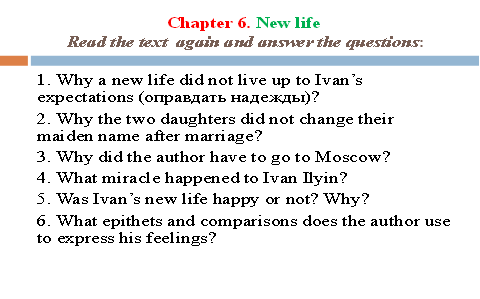
Chapter 7. The work that I missed
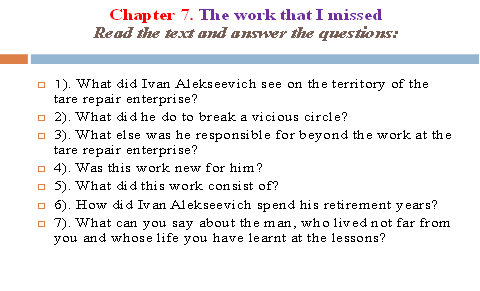
I remember my first day at the tare repair enterprise (таро ремонтное предприятие) - the containers scattered across the territory and casually dumped into piles. Crumpled, gloomy (помятые и хмурые) in the morning and noticeably cheerful after 11 a.m. persons were wandering around the yard ... Yes, one cannot do without strong labor discipline. Why do people work poorly? The answer is simple: they earn little. And why do they earn little? Because they work poorly. The result is a vicious circle (порочный круг) that needs to be broken.
Having studied the reasons for regress, I began to work to improve working and living conditions for employees, increase motivation in achieving high performance indicators and strengthen labor discipline. The company began making a profit (прибыль).
We then won the first place and were given the passing Red Banner. Workers began to live better, getting bonuses and the "thirteenth" salary, some even bought personal cars, and most importantly, I managed to receive apartments for several families. Two buses, two cars and trucks were bought for the enterprise.
Along with this responsible work, I was engaged in another one - no less responsible. This is a work in a public reception room of newspapers (общественная приёмная газеты), first, in “Pravda Buryatiyi”, and then in “Buryatia”. This business was familiar to me: before arriving in the republic, I conducted social activities in the newspaper “The Banner of Communism” in the city of Angarsk.
Being at the head of the public reception, I was busy with making a schedule (график) for the reception of citizens, attracting specialists and managers of different levels. To participate in the raid with visits large families living in the railway district and to help them, I invited Leonid Potapov – The President of the Republic.
My work also included meeting a lot of different people and trips around the town. I took responsibility for the fate of people who turned to me as the last resort (последняя инстанция) in solving their problems – problems of any kind.
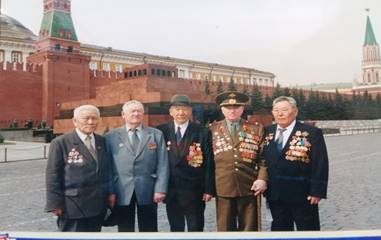
The year 1983 came, the year of my sixtieth birthday, the retire year (пенсия). My wife and I started gardening. My Lisa's tomatoes were the most juicy and fleshy. But we did not immediately begin to succeed in obtaining a rich harvest, at first neighbors helped us with their tips. We became friends and even in winter we went to visit each other for anniversaries and birthdays. Unfortunately, all good things end sometimes…
|
|
If you see this photo with a memorial plaque… It means that I am not with you now but I am grateful to you for touching my life and taking with me just for a while a little trip into the past. |
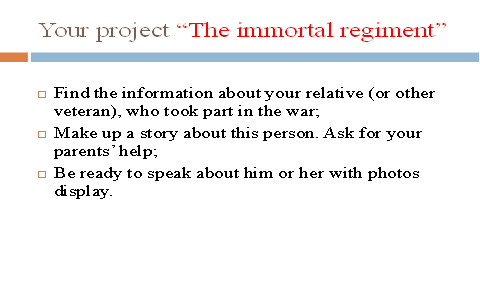
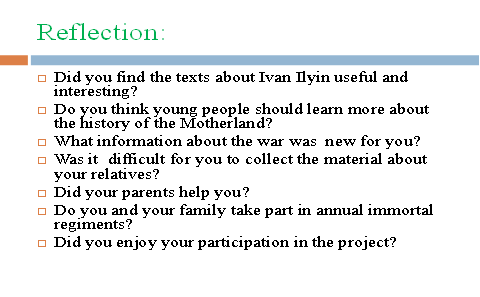
Conclusion
The implementation of this project, undoubtedly, brings positive results, both in the development of different type’s ability of reading texts in English, and in the formation of the patriotic attitude of young people to their Homeland. The content of the texts for reading about the life of a veteran makes it possible to get acquainted with the history of the country, expand knowledge about the Great Patriotic War and encourage students to search and study information about a member of their family who took part in the fighting.
Thanks to the organization of "The Immortal Regiment" campaign, at the final lesson of the project, high school students show moral and patriotic qualities, such as respect for the soldiers – defenders of the Motherland, pride in the feat of the nation and involvement in the history of their family. During the implementation of the project, not only the ability to work with the text, but also such speech skills as making statements in written and oral forms are developed. Besides, the use of research skills is also required. So, we make a conclusion that we should pay attention to our veterans of the war not only on Victory Day, but throughout the year. It is not a one – time action.
List of used literature
1. Гуревич, С.А. Организация чтения учащихся старших классов/ С.А. Гуревич - М., 2004.
2. Курндорф, Б.Ф. Методика преподавания иностранного языка в средней школе/ Б.Ф. Курндорф- М., 2008.
3. Рогова, Г.В. Цели и задачи обучения иностранному языку/ Г.В. Рогова // Иностранные языки в школе, 2004.
4. Саланович, Н.А. Роль и место чтения художественных текстов на старшем этапе обучения / Н.А.Саланович // Иностранные языки в школе - 2001 г №3
5. Уэст, М. Методика обучения чтению/ М. Уэст // Иностранные языки в школе.-2003-№3.- С.46-47.
6. Фоломкина, С.К. Обучение чтению: (текст лекций)/ С.К. Фоломкина- М., 2008. – 124
7. Майя Ильина. Вперёд в прошлое. – Изд. БНЦСОРАН, 2019;
8. Скачано с www.znanio.ru
Материалы на данной страницы взяты из открытых источников либо размещены пользователем в соответствии с договором-офертой сайта. Вы можете сообщить о нарушении.